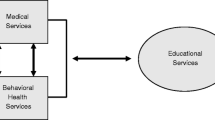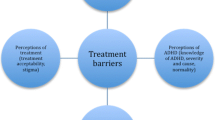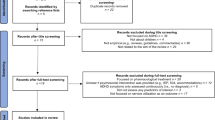Abstract
This article reviews recent research that examines service use for attention-deficit/hyperactivity disorder among Latino children. Using MEDLINE, PsycInfo, and PubMed, literature searches were conducted for research published between January 2008 and April 2010 that specifically focused on Latino children or included a sufficient sample of Latino children and examined racial/ethnic differences between groups. Eight studies regarding general service use, treatment with medication, and parenting interventions were identified and are reviewed herein. Results of these studies highlight important factors associated with the continued mental health service use disparities among Latino children, such as parental attitudes toward service use. Results also provide much-needed data with regard to adapting and engaging Latino parents into parenting interventions. Suggestions for clinical practice and future research are discussed.
Similar content being viewed by others
References
Papers of particular interest, published recently, have been highlighted as: • Of importance
American Psychiatric Association: Diagnostic and Statistical Manual of Mental Disorders, edn 4 (text revision). Washington, DC: American Psychiatric Association; 2000.
DuPaul GJ, Stoner G: ADHD in the Schools: Assessment and Intervention Strategies, edn 2. New York: Guilford Press; 2003.
American Academy of Pediatrics: Clinical practice guideline: treatment of the school-aged child with attention-deficit/hyperactivity disorder. Pediatrics 2001, 108:1033–1044.
Pliszka S: Practice parameter for the assessment and treatment of children and adolescents with attention-deficit/hyperactivity disorder. J Am Acad Child Adolesc Psychiatry 2007, 46:894–921.
• Bird HR, Shrout PE, Duarte CS, et al.: Longitudinal mental health service and medication use for ADHD among Puerto Rican youth in two contexts. J Am Acad Child Adolesc Psychiatry 2008, 47:879–889. Results of this study provide unique information regarding service utilization for ADHD for Puerto Rican children in the South Bronx, NY, and Puerto Rico based on longitudinal data across 3 years from 2491 children 5 to 13 years of age. This study is particularly notable for its ability to disentangle ethnicity from context in examining service utilization patterns.
Montiel C, Pena JA, Montiel-Barbero I, Polanczyk G: Prevalence rates of attention deficit/hyperactivity disorder in a school sample of Venezuelan children. Child Psychiatry Hum Dev 2008, 39:311–322.
Therrien M, Ramirez RR: The Hispanic Population in the United States: March, 2000. Current Population Reports. Washington, DC: US Census Bureau; 2000.
• Leslie LK, Lambros KM, Aarons GA, et al.: School-based service use by youth with ADHD in public-sector settings. J Emot Behav Disord 2008, 16:163–177. Using the National Health Interview Survey, a national household survey, as a source, this study analyzed data from 2004 to 2006 for 23,051 youth 6 to 17 years of age to examine the prevalence of diagnosed ADHD and learning disability. The study also examined service utilization across race/ethnicity by diagnostic, demographic, and insurance characteristics. Results highlight important factors that increase service utilization among children.
Pastor PN, Reuben CA: Vital and Health Statistics, Series 10: Data From the National Health Survey. Diagnosed Attention Deficit Hyperactivity Disorder and Learning Disability: United States, 2004–2006. Hyattsville, MD: National Center for Health Statistics; 2008.
Tamayo JM, Pumariega A, Rothe EM, et al.: Latino versus Caucasian response to atomoxetine in attention-deficit/hyperactivity disorder. J Child Adolesc Psychopharmacol 2008, 18:44–53.
MTA Cooperative Group: Moderators and mediators of treatment response for children with attention-deficit/hyperactivity disorder: the Multimodal Treatment Study of Children With Attention-Deficit/Hyperactivity Disorder. Arch Gen Psychiatry 1999, 56:1088–1096.
Arnold E, Elliott M, Sachs L, et al.: Effects of ethnicity on treatment attendance, stimulant response/dose, and 14-month outcome on ADHD. J Consult Clin Psychol 2003, 71:713–727.
Pelham WE Jr, Fabiano GA: Evidence-based psychosocial treatments for attention-deficit/hyperactivity disorder. J Clin Child Adolesc Psychol 2008, 37:184–214.
McCabe KM: Factors that predict premature termination among Mexican-American children in outpatient psychotherapy. J Child Fam Stud 2002, 11:347–359.
Reyno SM, McGrath PJ: Predictors of parent training efficacy for child externalizing behavior problems—a meta-analytic review. J Child Psychol Psychiatry 2006, 47:99–111.
Forehand R, Kotchick BA: Cultural diversity: a wake-up call for parent training. Behav Ther 1996, 27:187–206.
Forehand R, Kotchick BA: Behavioral parent training: current challenges and potential solutions. J Child Fam Stud 2002, 11:377–384.
Martinez CR Jr, Eddy JM: Effects of culturally adapted parent management training on Latino youth behavioral health outcomes. J Consult Clin Psychol 2005, 73:841–851.
Matos M, Torres R, Santiago R, et al.: Adaptation of parent-child interaction therapy for Puerto Rican families: a preliminary study. Fam Process 2006, 45:205–222.
McCabe KM, Yeh M, Garland AF, et al.: The GANA program: a tailoring approach to adapting parent child interaction therapy for Mexican Americans. Educ Treat Children 2005, 28:111–129.
• Matos M, Bauermeister JJ, Bernal G: Parent-child interaction therapy for Puerto Rican preschool children with ADHD and behavior problems: a pilot efficacy study. Fam Process 2009, 48:232–252. This is the second study in an ongoing program of research being conducted by Matos and colleagues that uses a systematic approach to adapting parent training for Puerto Rican families. The study presents pilot data for a previously adapted version of PCIT and provides preliminary support for the adapted program.
Eyberg SM: Parent-child interaction therapy: integration of traditional and behavioral concerns. Child Fam Behav Ther 1988, 10:33–46.
Bernal G: Intervention development and cultural adaptation research with diverse families. Fam Process 2006, 45:143–151.
Cohen J: Statistical Power Analysis for the Behavioral Sciences, edn 2. Hillsdale, NJ: Lawrence Erlbaum Associates; 1988.
Gross D, Garvey C, Julion W, et al.: Efficacy of the Chicago parent program with low-income African American and Latino parents of young children. Prev Sci 2009, 10:54–65.
Webster-Stratton C: Videotape modeling: a method of parent education. J Clin Child Psychol 1981, 10:93–98.
Eyberg SM, Ross AW: Assessment of child behavior problems: the validation of a new inventory. J Clin Child Psychol 1978, 7:113–116.
Lakes KD, Kettler RJ, Schmidt J, et al.: The CUIDAR early intervention parent training program for preschoolers at risk for behavioral disorders: an innovative practice for reducing disparities in access to service. J Early Int 2009, 31:167–178.
Cunningham CE, Bremner R, Boyle M: Large group community-based parenting programs for families of preschoolers at risk for disruptive behaviour disorders: utilization, cost effectiveness, and outcome. J Child Psychol Psychiatry 1995, 36:1141–1159.
Bourdon KH, Goodman R, Rae DS, et al.: The Strengths and Difficulties Questionnaire: U.S. normative data and psychometric properties. J Am Acad Child Adolesc Psychiatry 2005, 44:557–564.
Gerdes AC, Schneider BW: Evidence-based ADHD treatment with a Spanish-speaking Latino family. Clin Case Stud 2009, 8:174–192.
Centers for Disease Control and Prevention: Mental health in the United States: prevalence of diagnosis and medication treatment for attention-deficit/hyperactivity disorder—United States, 2003. Morb Mortal Wky Rep 2005, 54:842–847.
Bauermeister JJ, Canino G, Bravo M, et al.: Stimulant and psychosocial treatment of ADHD in Latino/Hispanic children. J Am Acad Child Adolesc Psychiatry 2003, 42:851–855.
Kataoka SH, Zhang L, Wells KB: Unmet need for mental health care among U.S. children: variation by ethnicity and insurance status. Am J Psychiatry 2002, 159:1548–1555.
McCabe K, Yeh M, Hough RL, et al.: Racial/ethnic representation across five public sectors of care for youth. J Emot Behav Disord 1999, 7:72–82.
Cauce AM, Domenech-Rodriguez M, Paradise M, et al.: Cultural and contextual influences in mental health help seeking: a focus on ethnic minority youth. J Consult Clin Psychol 2002, 70:44–55.
Eiraldi RB, Mazzuca LB, Clarke AT, Power TJ: Service utilization among ethnic minority children with ADHD: a model of help-seeking behavior. Adm Policy Ment Health 2006, 33:607–622.
Bussing R, Zima BT, Gary FA, Garvan CW: Barriers to detection, help-seeking, and service use for children with ADHD symptoms. J Behav Health Serv Res 2003, 30:176–189.
Yeh M, McCabe K, Hough RL, et al.: Racial/ethnic differences in parental endorsement of barriers to mental health services for youth. Ment Health Serv Res 2003, 5:65–77.
Disclosure
No potential conflicts of interest relevant to this article were reported.
Author information
Authors and Affiliations
Corresponding author
Rights and permissions
About this article
Cite this article
Eiraldi, R., Diaz, Y. Use of Treatment Services for Attention-Deficit/Hyperactivity Disorder in Latino Children. Curr Psychiatry Rep 12, 403–408 (2010). https://doi.org/10.1007/s11920-010-0139-1
Published:
Issue Date:
DOI: https://doi.org/10.1007/s11920-010-0139-1




